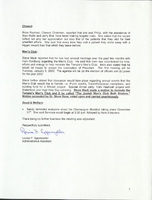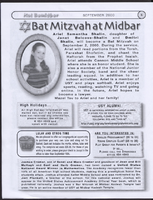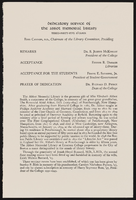Search the Special Collections and Archives Portal
Search Results

Minutes from Temple Beth Sholom Board of Directors meetings, June 1999 - December 1999
Date
Archival Collection
Description
Meeting minutes include reports from committees of the board, correspondence, and balance sheets.
Text

Arsya Respati oral history interview: transcript
Date
Archival Collection
Description
Oral history interview with Arsya Respati conducted by Madison Chang on December 4, 2021 for Reflections: The Las Vegas Asian American and Pacific Islander Oral History Project. University of Nevada, Las Vegas (UNLV) student Arsya Respati shares his childhood and upbringing in Jakarta, Indonesia and educational background. He discusses his studies at the international BINUS SCHOOL Simprug in Jakarta and his immigration to the United States with his younger brother to pursue the culinary arts at the William F. Harrah College of Hospitality at UNLV. Arsya Respati talks about his relationship with his parents and their daily communication, his "aunty" who has helped him adjust to American culture and homesickness, his Muslim faith and traditions, and his employment. He also shares his views on Indonesian politics and cultural diversity, and the diversity of Las Vegas.
Text
Beula Jane Adams oral history interview
Identifier
Abstract
Oral history interview with educator Beula Jane Adams (b. 1902) conducted by Maureen Conner on May 11, 1977 for the Ralph Roske Oral History Project on Early Las Vegas. Born in Smithfield, Nebraska, Adams relocated to Las Vegas, Nevada in 1932. During the interview Adams explores and highlights the role of education in relation to the social development of Nevada. Adams discusses presidential visits, early above ground atomic tests, and her involvement in local politics.
Archival Collection
Marihka "Minddie" Lloyd oral history interview
Identifier
Abstract
Oral history interview with Marihka "Minddie" Lloyd conducted by Kristel Peralta and Stefani Evans on June 15, 2021 for Reflections: The Las Vegas Asian American and Pacific Islander Oral History Project. Minddie talks about her upbringing in Manila, Philippines by her paternal grandmother and sisters (her Lolas) and her immigration to the United States at a young age. her personal history and childhood, including abuse that she suffered and her time in foster homes and a girls' home, Olive Crest. Minddie discusses the mentors she met through Olive Crest and her move to Las Vegas as an adult where she met her husband, an undercover Las Vegas Metro officer. Minddie talks about her employment with Hawaiian Air Lines, her support of the Injured Police Officers' Fund, and the creation of "Bamboo Bridges," a nonprofit organization based in Henderson, Nevada that aids abused, trafficked Asian women. Minddie also shares how she and her husband both contracted COVID-19 in 2020, and the untimely death of her spouse the day Minddie was released from the hospital. She shares how this event caused her to convert from Catholicism to the Church of Jesus Christ of Latter-Day Saints, the religion of her late husband.
Archival Collection

Transcript of interview with Doris, Gerald and Marcy Welt by Barbara Tabach, November 30, 2014
Date
Archival Collection
Description
Interview with Doris, Gerald "Jerry", and Marcy Welt by Barbara Tabach on November 30, 2014. In this interview, the Welts discuss how they came to Las Vegas in the early 1970s from California, and Eli Welt's pawnshop, Stoney's, which he acquired from Doris's father, Jerry Fox. Jerry and Marcy talk about how they met and came to Las Vegas, where Jerry worked for Harry Reid's law firm. They talk about the community that existed in Las Vegas at the time, and their involvement with B'nai B'rith.
Just before the start of the Great Depression, Doris Fox was born in Detroit, Michigan. At the age of fifteen, she met Eli Welt, and the two were married three years later in Alexandria, Louisiana, where Eli was stationed with the United States Army Air Corps. Eventually, Doris and Eli moved to southern California with their three children-Gerald (aka Jerry), Richard (aka Rick) and Susan (aka Sue). In 1971, after all their children were out of the house, Doris and Eli moved to Las Vegas. They followed Doris' father, Jerry "Stoney" Fox, who had moved to the city in the 1940s, and was one of the first entrants into the local pawnshop industry. Like many migrants to the city, Eli became active in the Jewish community, particularly with B'nai Brith and Jewish Family Service Agency. Doris and Eli's eldest son, Jerry, and wife, Marcy, moved to Las Vegas in 1972 with their two small children. Tiffany and Cory. Jerry and Marcy had met through a Jewish youth group as teenagers in Anaheim, California. Having just finished law school, Jerry found that legal career opportunities were plentiful in the growing city. His first job was as a law clerk with Harry Reid's law office, Beckley, DeLanoy, Jemison and Reid, later becoming an associate attorney. He assisted Reid as lieutenant governor and on his early political campaigns. Jerry left Beckley, DeLanoy, Jemison and Reid to work for Oscar Goodman's firm-Goodman, Snyder and Gang-focusing on civil litigation. In 1975, Jerry opened his own practice, continuing to specialize in civil ligation, and served as general counsel to Las Vegas Clark County Library District. Since their arrival, Marcy and Jerry have been dedicated to community service, particularly within the Jewish community. Both were active in youth programs at Temple Beth Sholom, Jerry even serving as youth commissioner and later, education director. Marcy worked with Edythe Katz at the Holocaust Resource Center and assisted with producing a film and training program for educators. Both are avid supporters of youth travel to Israel and work hard to ensure these opportunities continue to be available for those interested.
Text

Michael Arage oral history interview: transcript
Date
Archival Collection
Description
Oral history interview with Michael Arage conducted by Dalton DuPré on November 12, 2021 for Reflections: The Las Vegas Asian American and Pacific Islander Oral History Project. In this interview, Michael Arage discusses his upbringing in the Greater Toronto Area (GTA), Ontario, Canada with his sister and his Filipino-Palestinian heritage. He talks about how his parents immigrated to the United States, his life and education in Toronto, and his relocation to Los Angeles, California where he married his wife. Michael Arage shares how the couple moved to Las Vegas, Nevada in 2012 when his wife started a job at Zappos. Because he lacked a work visa, Michael Arage began playing poker and working in sports betting. In 2019, he founded a community organization to support the people of Palestine, called Nevadans for Palestinian Human Rights. Michael Arage talks about his activism efforts, anti-Arab racism, his cultural upbringing, and of Filipino and Arabic foods and customs. He also shares his views of living in Las Vegas, the difficulties of raising a child away from her cousins, and differing governmental policies and healthcare between Canada and the United States.
Text

Jewish Federation correspondence, meeting minutes, and other records, item 32
Description
Passage to Freedom document about Soviet refugee resettlement, circa 1988.
Hillel Jewish Student Center at UNLV
Hillel at the University of Nevada, Las Vegas (UNLV) was founded in 1976 by Roberta Sabbath. Jewish Federation director Jerry Countess encouraged Sabbath to start a Hillel group and provided funding of $3,000 for the first year. Hillel is a national organization that engages Jewish students on university campuses and encourages them to stay involved in Judaism. It provides activities, a way for Jewish students to network, and an on-campus Jewish community. Hillel's programming includes social and holiday events, educational speakers, and Shabbat services and dinners.
Corporate Body


